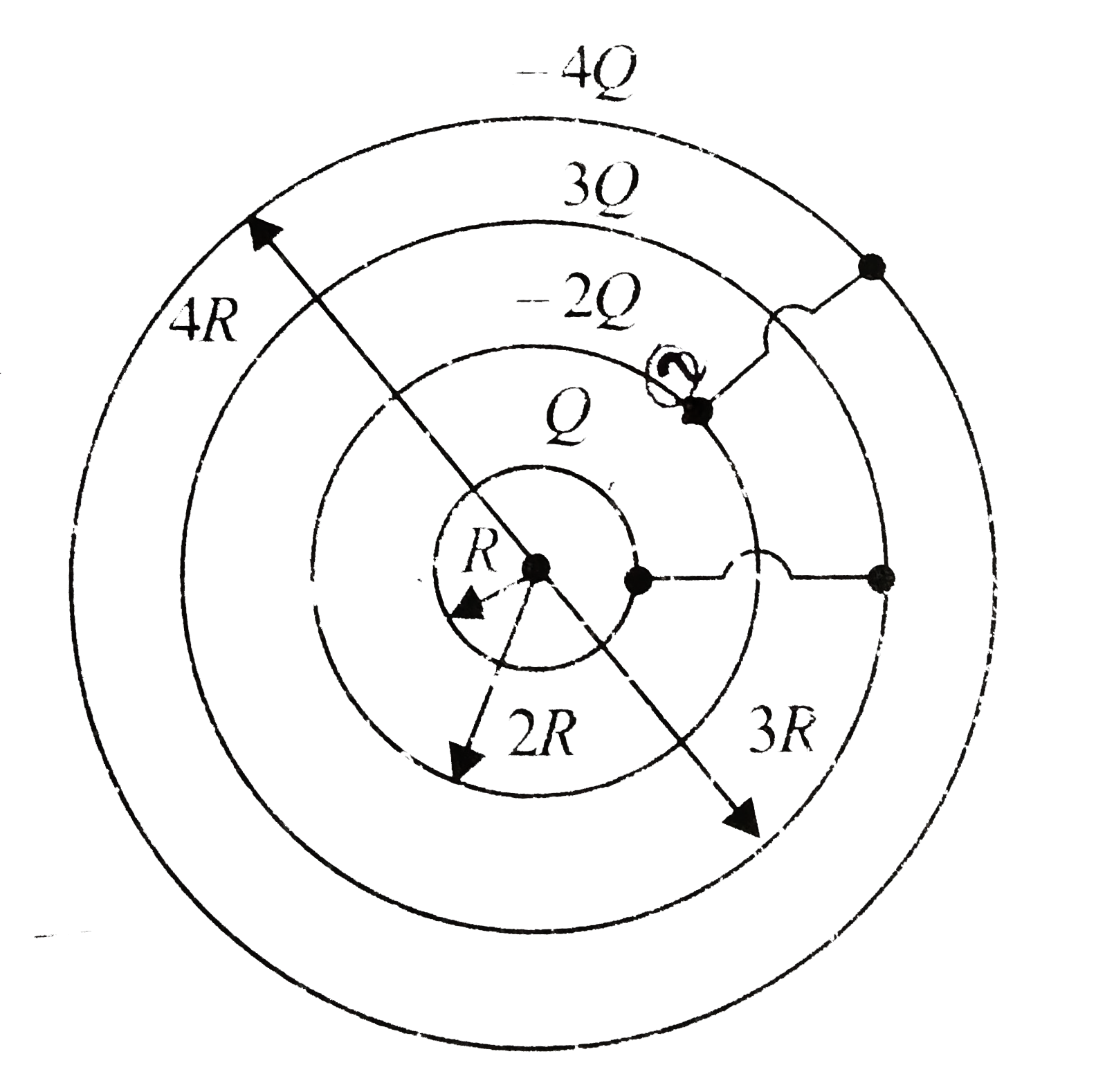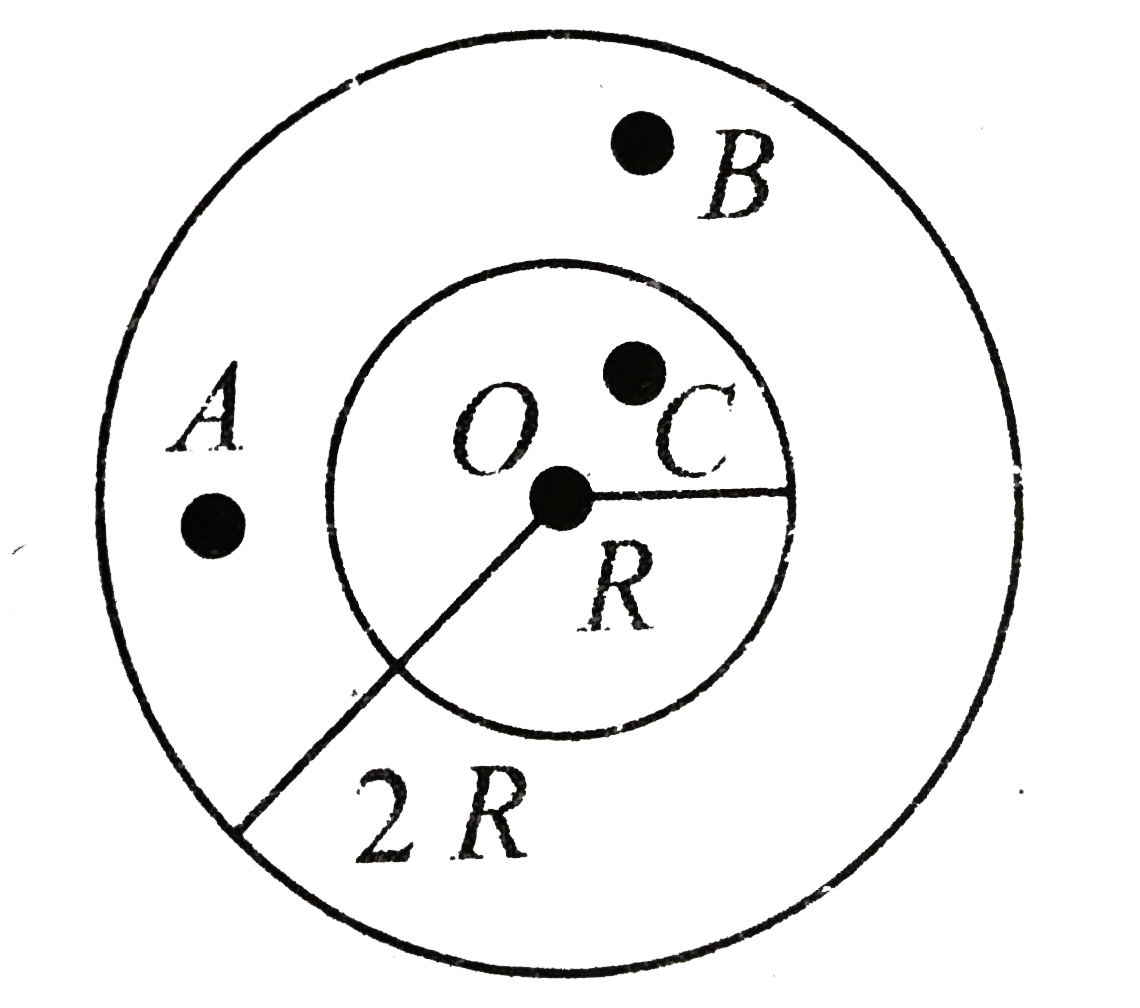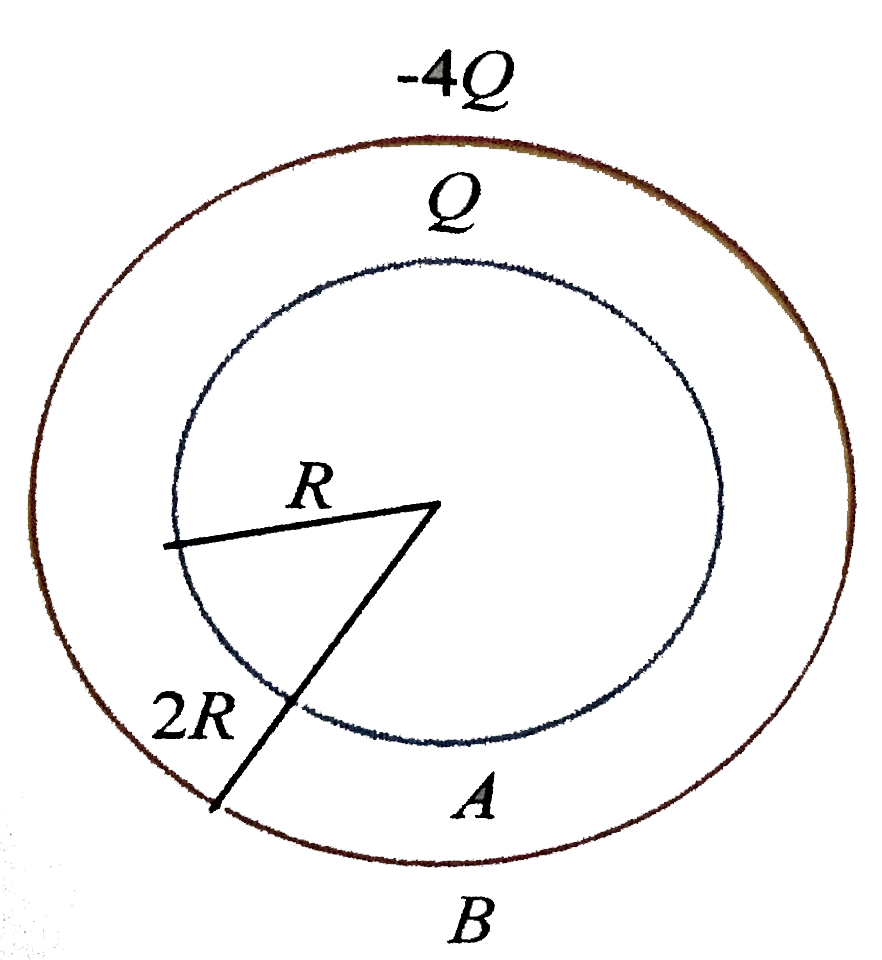Four concentric hollow spheres of radii R, 2R, 3R, and 4R are given the charges as shown in figure. Then the conductors 1 and 3, 2 and 4 are connected by conducting wires (both the connections are made at the same time.)

3Q/40πε0R
−19Q/40πε0R
−3Q/40πε0R
19Q/40πε0R
The correct Answer is:C

Let the charge distribution be as shown in fig
From gauss's theorem we know that facing surface s of the conductor acquire equal and oppsite charges. So
V1=V3 and V2=V4
q1+q3−q2=+4Q .(i)
Now, q2−q1+q4−q3=−6Q ..(ii)
V1=14πε0[q1R+q2−q12R+q3−q23R+q4−q34R]
V2=14πε0[q12R+q2−q12R+q3−q23R+q4−q34R]
V3=14πε0[q13R+q2−q13R+q3−q23R+q4−q34R]
V4=14πε0[q14R+q2−q14R+q3−q23R+q4−q34R]
from V1=V3,q1=−q23
from V2=V4,q2=−q32
On solving eq. (ii) q1=2Q5,q2=−6Q5 and q3=12Q5
Substituting these values in Eq (ii) we get q4=−2Q
charge on the inner surface of the third conductor is −q2=6Q/5
charge on the fouth conductor is q4−q3=−2Q−12Q5=−22Q5
potential of conduction 1, V1=−3Q40πε0R=V3
Potential of conductor 2, V2=Q8πε0R=V4
Topper's Solved these Questions
- MISCELLANEOUS VOLUME 3BOOK - CENGAGE PHYSICSCHAPTER - MISCELLANEOUS VOLUME 3EXERCISE - Interger Answer type
20 Videos
- MISCELLANEOUS VOLUME 3BOOK - CENGAGE PHYSICSCHAPTER - MISCELLANEOUS VOLUME 3EXERCISE - Fill in the blanks
10 Videos
- MISCELLANEOUS VOLUME 3BOOK - CENGAGE PHYSICSCHAPTER - MISCELLANEOUS VOLUME 3EXERCISE - Assertion and Reason Type
8 Videos
- MECHANICAL PROPERTIES OF SOLIDSBOOK - CENGAGE PHYSICSCHAPTER - MECHANICAL PROPERTIES OF SOLIDSEXERCISE - Question Bank
4 Videos
- MISCELLANEOUS VOLUME 5BOOK - CENGAGE PHYSICSCHAPTER - MISCELLANEOUS VOLUME 5EXERCISE - Integer
12 Videos
Similar Questions
A hollow conducting sphere of inner radius r and outer radius 2R is given charge Q as shown in figure, then the

View SolutionConsider two concentric metalic shell's of radii R and 2R. The inner shell is having charge Q and outer shell is uncharged. If they are connected with a conducting wire. Then,
View Solution
Knowledge Check
A hollow conducting sphere of inner radius r and outer radius 2R is given charge Q as shown in figure, then the
 Apotential at A and B is same.Bpotential at O and B is same.Cpotential at O and C is same.Dpotential at A,B,C and O is same.
Apotential at A and B is same.Bpotential at O and B is same.Cpotential at O and C is same.Dpotential at A,B,C and O is same.Two concentric thin conducting sphereical shells having radii R and 2R are as shown in the figure .A charge +Q is given to the shell A and −4Q is given to the shell B .If A and B are connected by a thin conducting wire then the amount of heat produced after the connection is
 A3Q24πε0RBQ216πε0RC5q28πε0RDQ28πε0R
A3Q24πε0RBQ216πε0RC5q28πε0RDQ28πε0RTwo concentric spherical conducting shells of radii r and R (r<R) carry charges q and Q respectively . The two shells are now connected by a conducting wire. The final charge on the inner shell is
AzeroB(Q+q)rRC(Q−q)rRDqrR
Consider two concentric metalic shell's of radii R and 2R. The inner shell is having charge Q and outer shell is uncharged. If they are connected with a conducting wire. Then,
View SolutionTwo concentric spherical conducting shells of radii R and 2R are carrying charges q and 2q, respectively. Both are now connected by a conducting wire. Find the change in electric potential (inV) on the outer shell.
View SolutionTwo concentric spherical conducting shells of radii R and 2R carry charges Q and 2Qrespectively.Change in electric potential on the outer shell when both are connected by a conducting wire is (k=14πɛ0)
View SolutionTwo isolated metallic solid spheres of radii R and 2R are charged such that both have the same charge Q. The spheres are located far away from each other and connected by a thin conducting wire. Find the heat dissipated in the wire.
View SolutionTwo concentric spherical conducting shells of radii r and R (r<R) carry charges q and Q respectively . The two shells are now connected by a conducting wire. The final charge on the inner shell is
View Solution
